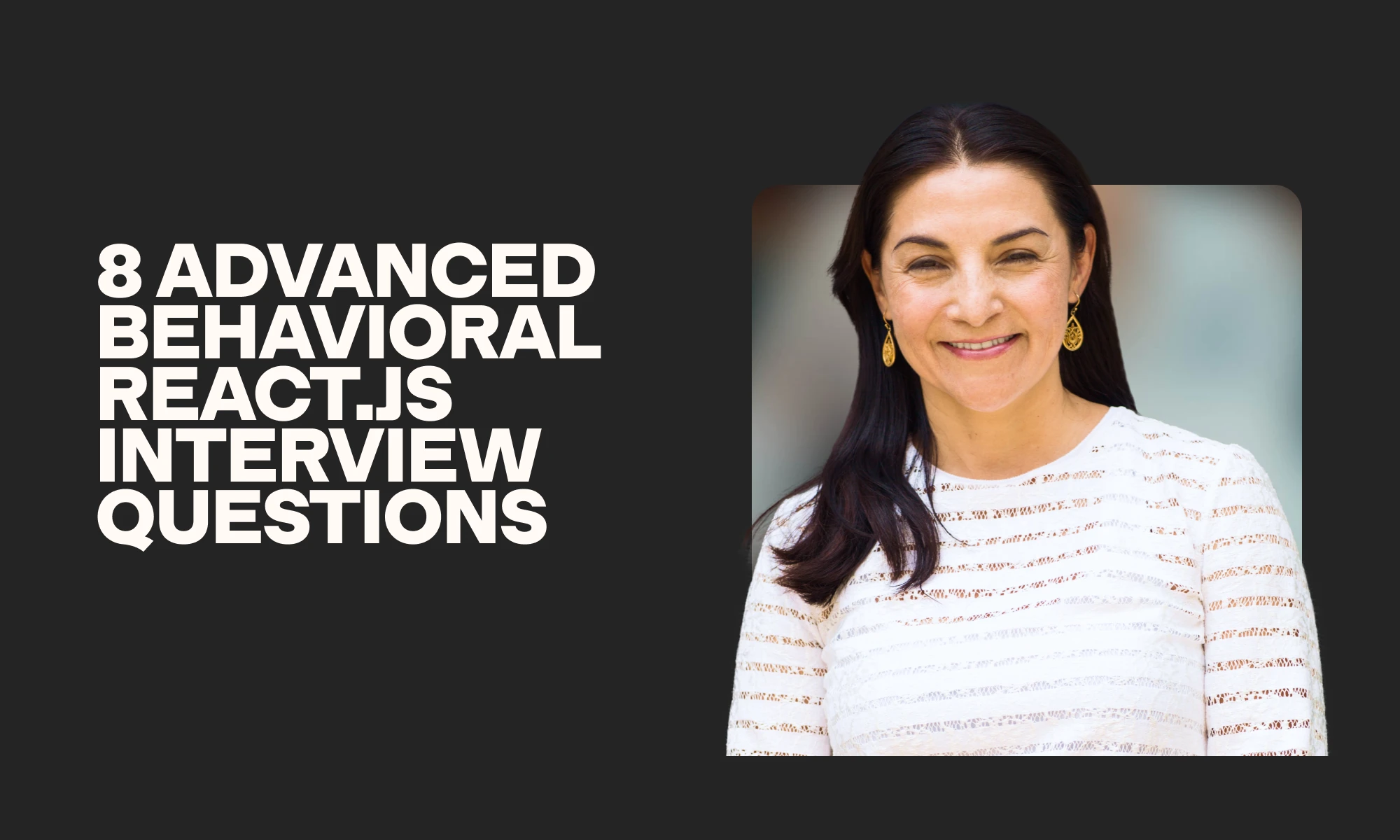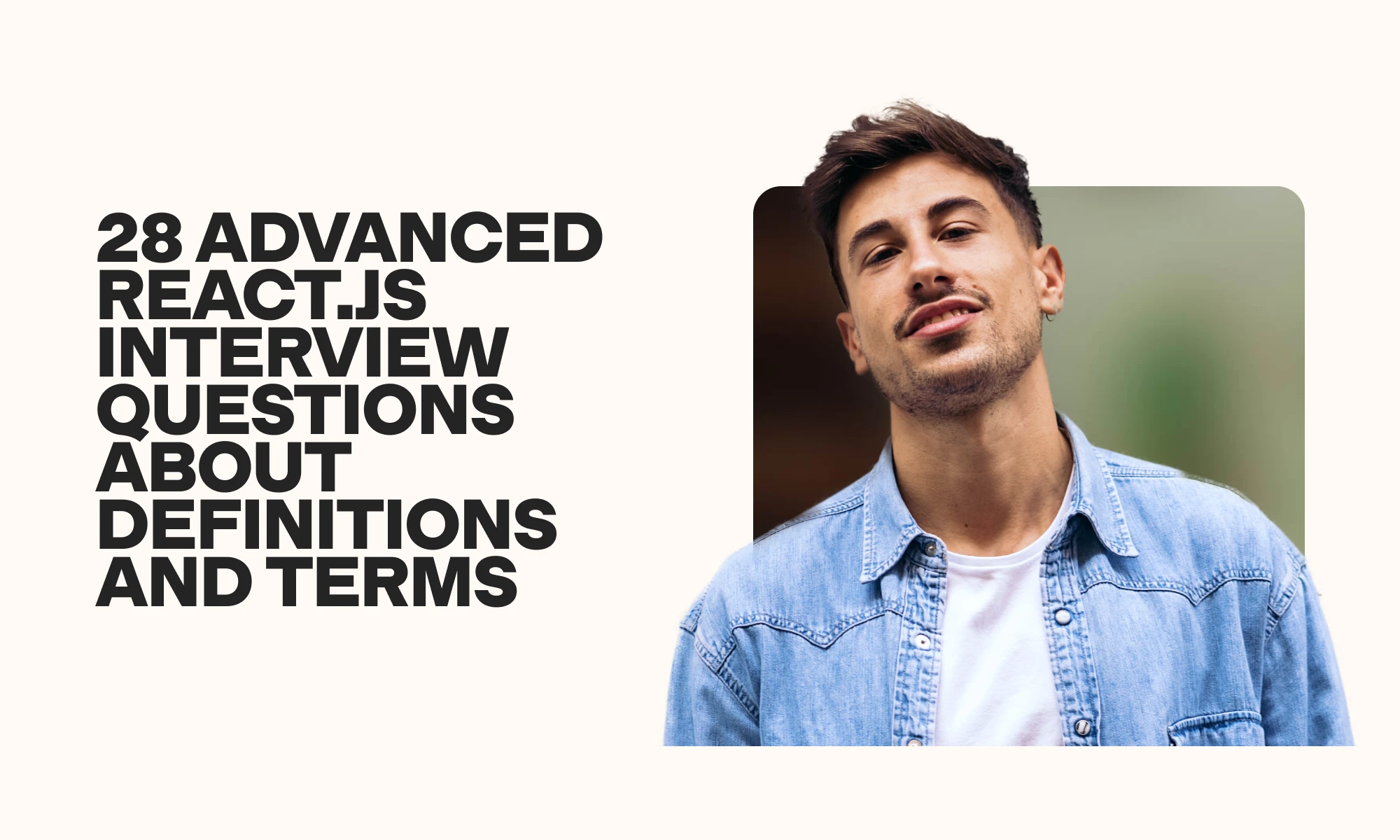45 advanced React.js interview questions
Evaluate your candidates' React.js skills with online testing
The React.js library is constantly evolving.
New root APIs and automatic batching developments are just a couple of the library’s latest features in 2022.
To keep up with all of these changes, developers and engineers who use React.js must keep their skills and knowledge sharp.
So if you’re hiring a developer, you need a method to assess their React.js skills.
The easiest way to assess candidates is to use skills assessments and then conduct interviews to evaluate their skills further.
This article has a comprehensive list of advanced React.js interview questions to help you find out about your candidates’ abilities.
Build your list of questions with ease by choosing from our advanced React.js interview questions below.
Table of contents
- 9 common advanced React.js interview questions
- 5 crucial common advanced React.js interview questions and answers to look for
- 8 advanced behavioral React.js interview questions
- 5 crucial advanced behavioral React.js interview questions and answers to look for
- 28 advanced React.js interview questions about definitions and terms
- 5 crucial advanced React.js interview questions and answers related to definitions and terms
- 8 tips for using advanced React.js interview questions
- Start creating your list of advanced React.js interview questions to hire top talent
9 common advanced React.js interview questions
In the section below, you’ll find nine common advanced React.js interview questions you can ask your candidates to assess their React.js knowledge and skills.
How do you create refs in React?
How often does the React useState update? Why?
Name three advantages of using React Hooks.
Name two advantages of using React.js.
Outline the different stages of the React.js lifecycle.
Explain why class methods should be bound to class instances.
What happens if you attempt to update the state directly?
Explain whether Hooks replace higher-order components.
Name one advantage of using Flux.
5 crucial common advanced React.js interview questions and answers to look for
Here are five key common advanced React.js interview questions from the section above and the answers you should look for from your candidates.
1. How do you create refs in React?
Can your candidates explain that they must use React.createRef() to create refs in React.js? They should also understand that the ref is often assigned to an instance property when constructing a component.
2. Name two advantages of using React.js.
Candidates may mention several advantages of using React.js when responding to this question. For example, they may explain that the library helps them build high-quality user interfaces or that it permits them to write custom components.
3. Name one advantage of using Flux.
Your candidates may start by explaining that Flux is a JavaScript architecture that operates on a unidirectional data flow. But do they know Flux offers many advantages for projects with dynamic data? For example, can they explain that Flux helps ensure dynamic data is updated effectively?
4. Name three advantages of using React Hooks.
Three advantages of using React Hooks are that they enable developers to:
Enhance component tree readability
Share logic among different components
Effectively handle the setup of side effects
5. How often does the React useState update? Why?
Since developers use useState to enhance performance by creating queues, React doesn’t update changes immediately. Candidates should know that useState doesn’t implement changes to the state object directly; instead, the updates occur asynchronously.
8 advanced behavioral React.js interview questions
This section includes eight advanced behavioral React.js interview questions you can ask to find out which methods your candidates use when working on React.js projects.
Which method would you use to handle events in React?
In which situation would you use refs in React?
Why would you use super constructors with props arguments?
How would you use validation on props?
Which method would you use to add attributes to components conditionally?
What methods would you use to check and improve slow app rendering in React?
In which situation would you use useMemo() in React?
How would you avoid binding in React?
5 crucial advanced behavioral React.js interview questions and answers to look for
Here are five of the most important advanced behavioral React.js interview questions from the section above and the answers you should look for from your candidates.
1. In which situation would you use refs in React?
Advanced candidates should understand that they can use React refs to access a DOM element. They may also explain that they would use refs to access an element they have created to change a child component’s value.
2. In which situation would you use useMemo() in React?
Do your candidates know that developers can use useMemo() to cache a variable’s value along with dependency lists? Can they explain that they would use useMemo() to help them avoid unnecessary re-renders? They may also say that useMemo() can be useful in situations where there are high processing amounts.
3. Why would you use super constructors with props arguments?
Candidates may explain that they pass props to super constructors to access and use this.props in the constructor. They may mention that when they implement a constructor() function within a React component, they use super() to call the parent constructor.
4. How would you avoid binding in React?
Candidates who have advanced React skills should be aware that they can use arrow functions in class properties to avoid binding in React. They may mention that class properties are a new feature and, to use them, a developer must enable transform-class-properties.
5. Which method would you use to handle events in React?
Can your candidates explain that to handle events in React, they would name them using camelCase (instead of lowercase)? They should be able to also explain that when they use JSX, they pass a function as the event handler (instead of a string).
Discover how easy it is to test candidates' programming skills with TestGorilla
Book a free live demo and find your next React.js developer.
28 advanced React.js interview questions about definitions and terms
Ask your candidates these advanced React.js interview questions about definitions and terms to discover if they have the knowledge to use the library efficiently.
Explain what a higher-order component is.
Explain what a mounted component is.
Explain what useState is.
Explain what an event is in React.
What is a class component?
What is a component?
What is the difference between class and functional components?
What is a state object?
What is a props object?
How are state objects different from props objects?
Explain what MVC architecture is.
Name an architectural difference between React and Angular.
Explain what a controlled component is.
Explain what an uncontrolled component is.
How are controlled and uncontrolled components different?
Explain what React Hooks are.
Explain what three dots mean in React.
What are package managers in React.js?
Explain what prop drilling is.
Explain what StrictMode is.
Explain what the Shadow DOM is.
Explain what the virtual DOM is.
How is the Shadow DOM different from the virtual DOM?
Explain what the React.js lifecycle methods are.
Explain what a pure function is.
Explain what JSX is.
Explain what Flux architecture is.
What are bundlers in React.js?
5 crucial advanced React.js interview questions and answers related to definitions and terms
Here are five vital advanced React.js interview questions about definitions and terms, along with answers you should listen for from candidates.
1. Explain what React Hooks are.
Hooks are a feature that was introduced in React 16.8. They enable you to use state and other React features without having to write a class. They’re called Hooks because they allow you to “hook” into React features. One example is the useState Hook, which allows you to add React state to function components.
2. What is a state object?
A state object is a plain JavaScript object that developers use in React to show information on a component’s current properties. Developers can manage the state object in the component. Changing the state object causes the component to re-render.
3. What is a props object?
A props object takes the form of an ordinary object. Candidates should be able to explain that props objects abide by immutable properties, meaning that a component cannot change its own props object.
4. What is a class component?
A class component is a simple class that consists of several functions. It accepts props as arguments and returns React elements. Developers must create render functions to use class components and receive React elements.
5. What is a component?
A component is a reusable piece of code that developers can use to return React elements that will be rendered to a page. Components can return other components, as well as arrays, numbers, and strings.
8 tips for using advanced React.js interview questions
Before we conclude this article, we have listed eight tips in this section for using advanced React.js interview questions before, during, and after the interview.
1. Use your job description as a guide to help you build a list of advanced React.js interview questions
With a specific outline and description of the job you’re hiring for, you can easily build a set of interview questions. The job description will help you determine which criteria your candidates should meet.
It will also indicate the nice-to-have and must-have qualifications, so base your questions on the information in the job description.
2. Complete the skills-testing process before asking any advanced React.js interview questions
Skills testing can also help you build your list of advanced React.js interview questions. For example, once your candidates have completed the assessments, you may notice that they lack technical React.js skills or knowledge related to components. You can use this as an opportunity to include an interview question related to React.js components to learn more about your candidates’ skills.
Unleash the power of online skills testing
Start your journey to stress-free hiring today with our free plan.
3. Review the responsibilities of the role in more detail
Begin the interview by introducing yourself and explaining the role’s responsibilities in more detail. Reviewing the role will enable your candidates to match themselves to it and ask you questions about the open position.
For example, explain whether the position will be permanent or part-time, and describe the working conditions of the job.
4. Begin the interview with general or common interview questions
Learn about your candidates’ work-related experience and backgrounds by asking a few general or common interview questions. Find out how interested they are in the role, and give them another opportunity to evaluate how they would perform in the position if hired.
5. Be consistent when asking advanced React.js interview questions
Consistency is vital when asking candidates advanced React.js interview questions. Asking the same questions will help you compare candidates and keep the interview process fair.
You can ask follow-up questions, but your main list of questions should be identical for all candidates. This approach will prompt them to give more information when responding to your questions.
6. Always use open-ended advanced React.js interview questions
You’ll get more information from your candidates if you use open-ended advanced React.js interview questions, so avoid asking closed-ended questions to which your candidates can only reply “yes” or “no.”
If you do use closed-ended questions, ask a follow-up question afterward to get more information from your candidates.
7. Invert the interview process toward the end of the interview
Give your candidates the chance to ask their own questions at the end of the interview. Inverting the interview process will ensure that your candidates can determine whether they are fully suited to the open position.
When you invert the interview process, be prepared to answer their questions honestly, and ensure you have the information they need before the interview.
8. Let candidates know when they will hear back from you
Thank candidates for their time and let them know when you will contact them about the interview. This shows them your courtesy and enhances the candidate experience.
Start creating your list of advanced React.js interview questions to hire top talent
With this list of advanced React.js interview questions, hiring top talent will be a stress-free process. Use the questions you require and build your own list to evaluate your candidates.
Remember that skills testing is an essential part of the interview process that can make hiring easier.
Build and distribute skills assessments before the interview to hire the best talent for your organization. To accomplish this, you can use TestGorilla’s skills-testing platform, which has the most diverse range of skills tests.
Nothing’s stopping you now. Hire an exceptional developer with skills assessments and advanced React.js interview questions.
Related posts
Hire the best candidates with TestGorilla
Create pre-employment assessments in minutes to screen candidates, save time, and hire the best talent.
Latest posts
The best advice in pre-employment testing, in your inbox.
No spam. Unsubscribe at any time.

Hire the best. No bias. No stress.
Our screening tests identify the best candidates and make your hiring decisions faster, easier, and bias-free.
Free resources
This checklist covers key features you should look for when choosing a skills testing platform
This resource will help you develop an onboarding checklist for new hires.
How to assess your candidates' attention to detail.
Learn how to get human resources certified through HRCI or SHRM.
Learn how you can improve the level of talent at your company.
Learn how CapitalT reduced hiring bias with online skills assessments.
Learn how to make the resume process more efficient and more effective.
Improve your hiring strategy with these 7 critical recruitment metrics.
Learn how Sukhi decreased time spent reviewing resumes by 83%!
Hire more efficiently with these hacks that 99% of recruiters aren't using.
Make a business case for diversity and inclusion initiatives with this data.






















